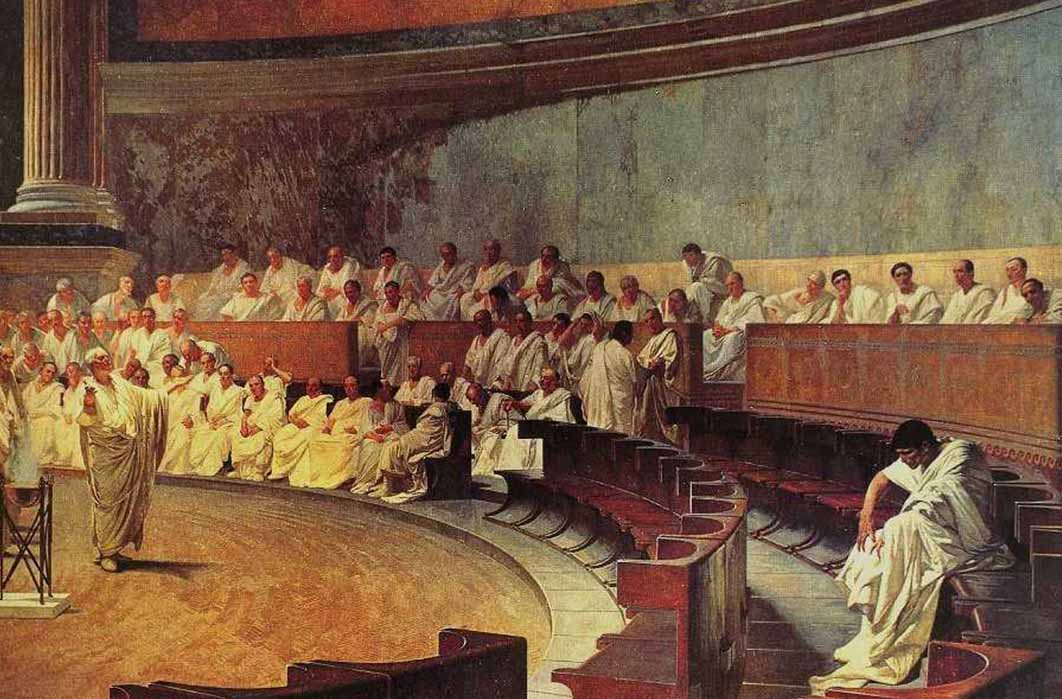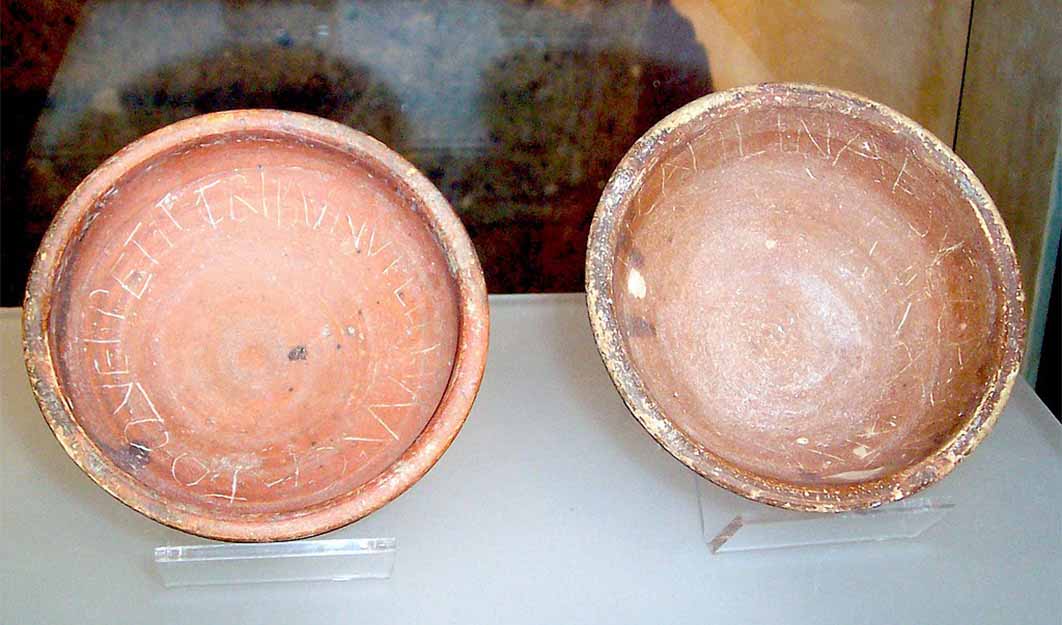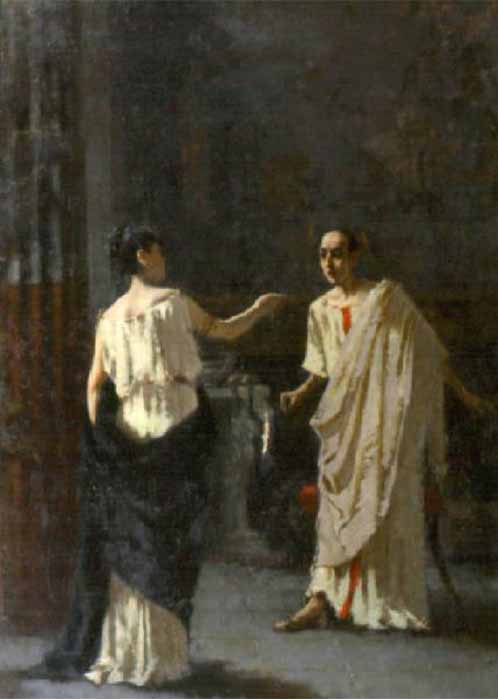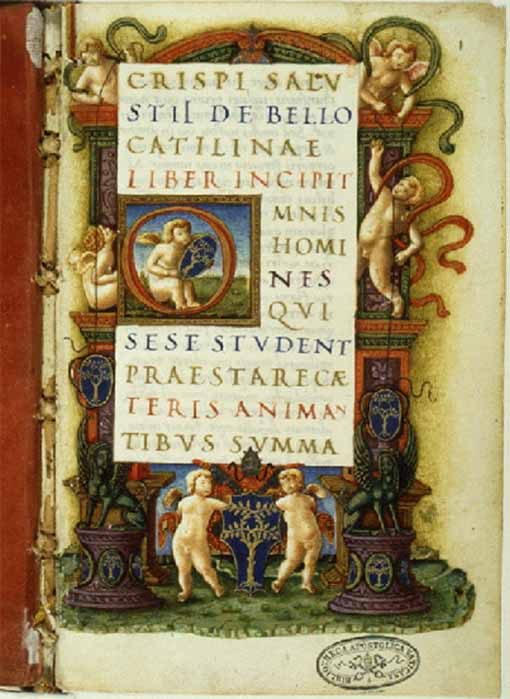
Conspiracy in Rome: Catiline The Eternal Villian?
L. Sergius Catilina (106 BC to 62 BC) was a Roman soldier and politician who attempted unsuccessfully to overthrow the Roman Republic following his second defeat for consul due to the efforts of his nemesis, M. Tullius Cicero. Catiline had been born into an ancient noble family whose luster had faded a century before his birth. He was probably trained from childhood to restore his family’s ancient glory by attaining the ultimate goal every Roman nobleman aspired to - the consulship. In the first century BC almost every individual who attained the consulship was a member of a family whose ancestors had attained the consulship in recent times. The odds of Catiline succeeding in his goal were not good.

Bowls containing food distributed in electoral canvasses. The bowl to the right was commissioned by Lucius Cassius Longinus and distributed in support of Catiline's consular candidacy in 63 BC. The bowl on the left was distributed by Marcus Porcius Cato in a coeval campaign for the plebeian tribunate (CC BY-SA 1.0)
Catiline, like almost all Roman nobles of his generation, was an experienced solder who apparently spent his early adulthood in the military service where he acquired a reputation as an able soldier and a charismatic leader. After leaving the army, Catiline became aligned with M. Licinius Crassus, the wealthiest Roman of his generation, who used his wealth to support upcoming politicians such as Catiline and Caesar. Catiline easily won elections for the first two offices- quaestor and praetor- which had to be held before the consulship. Winning such elections was relatively easy since each year there were 20 quaestors and eight praetors elected. The consulship was a different cup of tea. There were only two consuls elected annually.

Fulvia revealing the conspiracy to Cicero by Francesco Filippini (1879) (Public Domain)
Seeds of Conspiracy
In 64 BC Catiline ran against Cicero for the consulship and lost. He tried again in 63 BC to attain the consulship but lost in large part due to Cicero’s opposition. Believing that he had been wrongfully deprived of an office to which he felt entitled to by birth and cognizant of popular discontent, Catiline formed a conspiracy to overthrow the Republic. He fomented an armed insurrection in Etruria and planned to have the forces there march on Rome and join an insurrection in the city, which he would lead. The conspiracy was uncovered by Cicero who denounced Catiline in the senate which forced him to leave Rome and join the insurgent army in Etruria. Catiline’s lieutenants in the city continued their plans for an uprising when Catiline’s army approached the city. They blundered, however, by seeking an alliance with a Gallic tribe, the Allobroges, whose ambassadors were in the city. The Gauls were more pragmatic than the Catilinarians and betrayed the conspirators to Cicero who revealed the plot to the senate on December 3 in a masterful presentation which led to the arrest and execution of the Catilinarian leaders. Deprived of the planned support from the city, many of Catiline’s solders deserted. Catiline attempted to lead the remainder into Gaul to found a separate state. However, the government forces blocked the road to Gaul and forced Catiline and his army to engage in a desperate battle outside of Pistoia. The battle, in January, 62 BC, saw the defeat of the insurgents and the death of Catiline.
- Catiline’s Ambition: Born And Bred For Roman Consulship
- Marcus Tullius Cicero: Family Man, Friend and Father
- The Men Who Ruled The World From Rome
Catiline’s struggle has been immortalized by Cicero’s four orations against him (or rather against the conspiracy) and a history of the conspiracy entitled Bellum Catilinae written by C. Sallusticus Crispus, a discredited Roman politician, turned historian whose monograph constituted the Roman version of Paradise Lost with Catiline starring as Lucifer. Between Cicero and Sallust, the classical image of Catiline as the eternal villain was formulated albeit one subject to criticism in the 19th century.
Catiline’s Character
Sallust’s classical portrayal of Catiline shows him as a man “born of a noble clan, was of great strength of mind and body, but possessed of an evil and depraved character. From his youth, he loved civil discord, murder, pillage and political dissension; and among these he spent his early manhood. His body could endure hunger, cold, and lack of sleep to a degree which was unbelievable; his mind was reckless, cunning, changeable, capable of any form of pretense or concealment. Covetous of the possessions of others, he was wasteful of his own. Violent in his passions, he possessed a great deal of eloquence but little wisdom. His disordered mind always desired the monstrous, the gigantic and the incredible. After the dictatorship of L. Sulla, he was seized by a great desire to take over the Republic, little reckoning the means by which he would achieve this goal as long as he attained power himself”.





